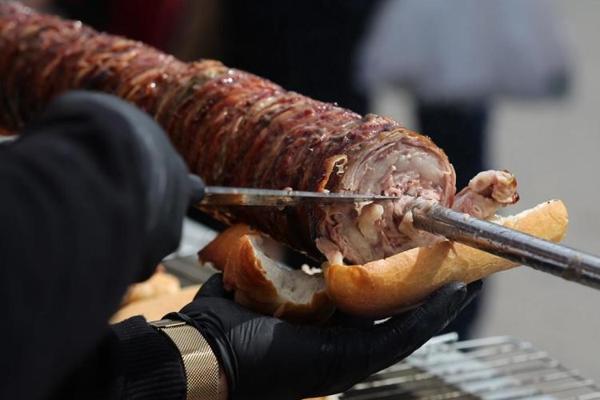Harmful bacteria lurk in Istanbul street food, says research
ISTANBUL


Many popular snacks sold by street vendors in Istanbul failed to clear safety tests, with lab reports of samples that showed the presence of harmful bacteria.
Pathogenic bacteria were detected in most of the foods sold on the street such as rice, chicken döner, sandwich and kokoreç (lamb intestine), reported in year-long research by a group of academics and scientists from Istanbul Gelişim University.
“Staphylococcus aureus” was found in 65 percent of the foods tested, while “e.coli” was detected in 25 percent of those products.
These bacteria are known to cause food poisoning, infections or serious illnesses.
Street foods were examined in a laboratory environment to measure their microbiological quality, then a survey was conducted to measure the food safety knowledge of street vendors, and finally, hand samples were taken from them in three stages of the research.
“We found salmonella in 10 percent of the foods tested. It is also a bacterium that causes typhoid,” said Murat Doğan from the research group.
“Since salmonella is a very risky bacterium, it may cause major problems in the human body when ingested. Millions of people died in the past from typhoid fever,” Doğan added.
Noting that the study was the first comprehensive research conducted in the country for the evaluation of street foods in terms of food safety, he pointed out the potential damage of microorganisms found in food.
Underlining that “staphylococcus aureus,” also known as staph, causes food poisoning in particular, the researcher noted that the biggest threat to public health is “e.coli.”
“This bacterium is fecal-borne, a major threat to public health. There is a major problem in terms of food safety in street foods. This situation should be taken under control as soon as possible,” Doğan stressed.
Among the list of street foods that contain bacteria of e.coli include chicken döner, rice with chicken, Albanian style fried diced liver, sandwich, and toast, according to the research.
Problematic results were obtained in terms of hygiene in nine out of 10 hand samples received from vendors within the scope of the research.
The research pointed out that sellers should wash their hands frequently rather than wear gloves, while the environment where the products are stored should also be disinfected.
Speaking to Demirören News Agency, many street vendors claimed that the results of the research are not correct and do not reflect the truth.
“We do not sell something that our customers wouldn’t like to eat. We must always give the best to get customers,” said Halil Ece, a kokoreç seller.
“We are careful to not work without wearing our masks and gloves,” he added.
Another rice seller noted he was careful not to work without his mask and gloves even before the outbreak of COVID-19.
“Whenever a customer comes, I disinfect the tables with a washcloth,” he said.
